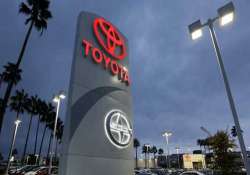Toyota to pay $1.2 billion to settle criminal probe
Washington: Toyota admitted that it hid information about defects that caused Toyota and Lexus vehicles to accelerate unexpectedly causing injuries and deaths and agreed to pay a record $1.2 billion to settle an investigation by

Washington: Toyota admitted that it hid information about defects that caused Toyota and Lexus vehicles to accelerate unexpectedly causing injuries and deaths and agreed to pay a record $1.2 billion to settle an investigation by the US government.
Attorney general Eric Holder said on Wednesday that the penalty is the largest of its kind ever imposed on an auto company. The four-year criminal investigation focused on whether Toyota promptly reported the problems related to unintended acceleration.
The company admitted to misleading consumers and regulators by assuring them that it had adequately addressed an acceleration problem stemming from ill-fitting floor mats — which attracted widespread publicity in 2009 following a car crash in San Diego that killed a family of four — through a limited safety recall of certain models.
Toyota knew at the time that it had not recalled other models susceptible to the same problem and also took steps to conceal from regulators a separate acceleration problem related to a faulty pedal, according to the Justice Department.
"In other words, Toyota confronted a public safety emergency as it if were a simple public relations problem," Holder said at a news conference.
According to a statement of facts filed in the case, an exasperated Toyota employee was said to have remarked at one point, "Idiots! Someone will go to jail if lies are repeatedly told. I can't support this."
Toyota said in a statement that in the four years since the recalls it had "made fundamental changes to become a more responsive and customer-focused organization, and we are committed to continued improvements."
The company's finances have recovered from the recalls, as well as the recession and the 2011 tsunami in Japan. But its once-sterling reputation for quality and reliability has been tarnished, and its market share is still below where it was in 2009.
Prosecutors filed a criminal charge on Wednesday alleging the company defrauded consumers by issuing misleading statements. They said they'll move to dismiss the charge in three years if Toyota complies with the terms of the settlement. An independent monitor will review policies, practices and procedures at the company.
No Toyota executives were charged under the deal. US Attorney Preet Bharara of the Southern District of New York, whose office brought the case, said he expected the agreement to be a "final resolution."
Starting in 2009, Toyota issued massive recalls, mostly in the US, totaling more than 10 million vehicles for various problems including faulty brakes, sticky gas pedals and ill-fitting floor mats. From 2010 through 2012, Toyota paid fines totaling more than $66 million for delays in reporting safety problems. Toyota agreed last year to pay more than $1 billion to owners of its cars who claimed to have suffered economic losses because of the recalls.
Attorney general Eric Holder said on Wednesday that the penalty is the largest of its kind ever imposed on an auto company. The four-year criminal investigation focused on whether Toyota promptly reported the problems related to unintended acceleration.
The company admitted to misleading consumers and regulators by assuring them that it had adequately addressed an acceleration problem stemming from ill-fitting floor mats — which attracted widespread publicity in 2009 following a car crash in San Diego that killed a family of four — through a limited safety recall of certain models.
Toyota knew at the time that it had not recalled other models susceptible to the same problem and also took steps to conceal from regulators a separate acceleration problem related to a faulty pedal, according to the Justice Department.
"In other words, Toyota confronted a public safety emergency as it if were a simple public relations problem," Holder said at a news conference.
According to a statement of facts filed in the case, an exasperated Toyota employee was said to have remarked at one point, "Idiots! Someone will go to jail if lies are repeatedly told. I can't support this."
Toyota said in a statement that in the four years since the recalls it had "made fundamental changes to become a more responsive and customer-focused organization, and we are committed to continued improvements."
The company's finances have recovered from the recalls, as well as the recession and the 2011 tsunami in Japan. But its once-sterling reputation for quality and reliability has been tarnished, and its market share is still below where it was in 2009.
Prosecutors filed a criminal charge on Wednesday alleging the company defrauded consumers by issuing misleading statements. They said they'll move to dismiss the charge in three years if Toyota complies with the terms of the settlement. An independent monitor will review policies, practices and procedures at the company.
No Toyota executives were charged under the deal. US Attorney Preet Bharara of the Southern District of New York, whose office brought the case, said he expected the agreement to be a "final resolution."
Starting in 2009, Toyota issued massive recalls, mostly in the US, totaling more than 10 million vehicles for various problems including faulty brakes, sticky gas pedals and ill-fitting floor mats. From 2010 through 2012, Toyota paid fines totaling more than $66 million for delays in reporting safety problems. Toyota agreed last year to pay more than $1 billion to owners of its cars who claimed to have suffered economic losses because of the recalls.